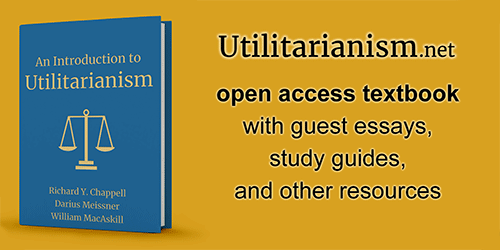Philosophy in “Lesser-Studied Languages”
An interview project “devoted to exploring the philosophical richness of lesser-studied languages from across the world” has published four interviews so far, with more on the way.

The project, “Philosophising In…” is the idea of Jonathan Egid (King’s College London), who says:
Despite recent acknowledgement of the global nature of philosophical thought, an overwhelming majority of work focuses on philosophy written in either classical languages (Greek, Latin, Arabic, Sanskrit, Mandarin) or contemporary European languages (German, French, English etc.). Although covering a hugely diverse body of literary philosophy, this focus nevertheless reflects the thought of only a small portion of humanity. This series aims to rectify this narrowness by examining the philosophical ideas of peoples the world over, especially those expressed in the languages, of Africa, Asia and the Americas.
The aim of these interviews is not only to draw attention to the rich philosophical resources of lesser-studied languages and to promote them as media of philosophy, but also to expand the horizons of contemporary philosophy by paying close attention to how concepts translate across languages—sometimes seamlessly, ‘like birds over borders’, sometimes with great difficulty. Paying attention to the differences and similarities between the philosophical word-concepts across languages allows us to take stock of how much of our philosophy is conditioned by the grammatical peculiarities of a particular language or set of languages, and how much have a wider application. The project thus aims to foster a philosophical multilingualism in the conviction that philosophy can only lose out by narrowing its focus to a single language or language family.
The detailed interviews are with philosophers who are experts in the language under consideration, and cover, among other things, distinctive philosophical ideas of that linguistic culture. At the end of each interview there is a brief lexicon of philosophical terms in the language.
The most recent interviews are with Workineh Kelbessa (Addis Ababa University), emphasizing philosophy in the language of Afaan Oromo, and Yury Arzhanov (Paris Lodron University Salzburg), focusing on philosophy in the language of Syriac.
Egid says he is very open to suggestions for further languages to include.
You can access the interviews here.



This is great news! As someone currently working on Mesoamerican philosophy (primarily texts in Nahuatl), it is great to see that others in the profession are interested in examining philosophy in lesser-known languages!
An interesting and exciting project! But the description oddly lists Mandarin (i.e., “Modern Standard Chinese”) as a classical language. The language of traditional Chinese philosophical texts is Classical Chinese, not Mandarin.